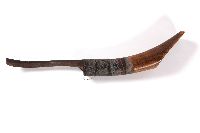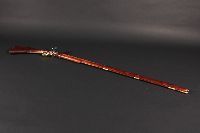Home > Europeans Arrive > Trading Posts - Europeans Arrive
Trading Posts
When the various European colonies were first established in North America, the settlements were located close to the trade gathering sites of the First Nations. Over the years a new European institution was introduced: the trading post. A trading post was a general store where furs could be traded, but it wasn't only that. It was also a storehouse for the furs, a workshop where some of the trading items were made (axes, for example) and living quarters. In some places it also served to defend the colony against enemies.
The First Nations that were allied with the English and Dutch travelled directly to their trading posts to trade furs. The French also had their own trading posts, but a new profession had appeared in the colony: coureur des bois (literally: wood-runner). These individuals bought merchandise at the general store, then travelled to the allied villages to exchange the goods for furs. It was as if the store at the trading post came to your home! The quantity of furs in the warehouses grew to such an extent that it was forbidden to courir les bois without the permission of the governor of the colony.
With the introduction of these two European innovations in North America, the Amerindian trade gatherings became less popular. Alliances were renewed in the presence of the governor of the colony at a major trading post, most often at Montreal or Quebec. But while the trade gatherings disappeared, some of the protocol was retained. The speeches and the exchange of gifts continued, although somewhat changed.
After several years during which the First Nations were weakened and reduced in number by disease and the wars for monopoly of the fur trade, the role of intermediary nation disappeared along with the trade gatherings. It was replaced by the many trading posts that extended further and further west.
This period may seem far in the past to you, but the last trading posts were only closed in the middle of the 20th century. Your grandparents may have known this period.










